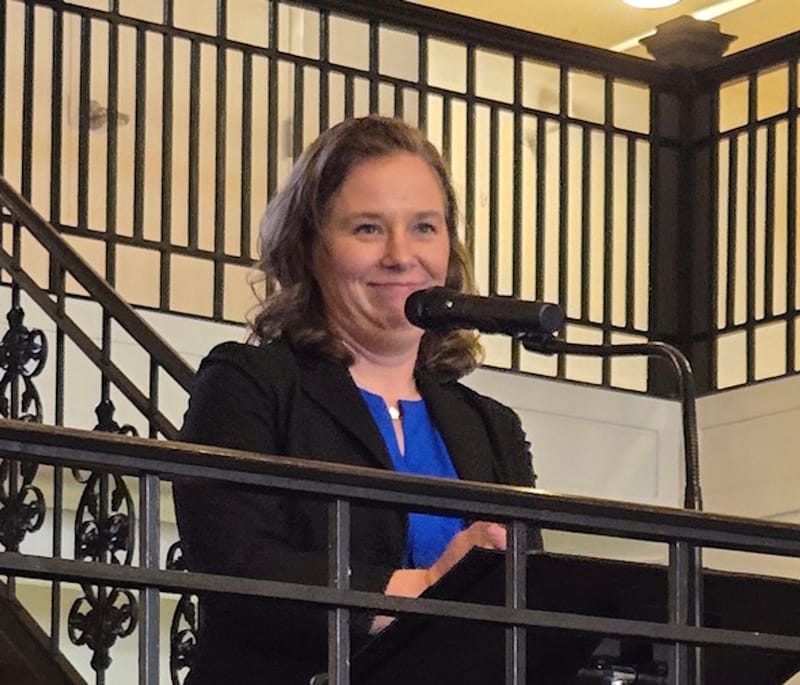Public education summit focuses on recent budget, hints at possible lawsuit
Dr. Julie Underwood argued that the legislature had an obligation to spend enough money to educate kids and to target that money in districts to meet those needs.
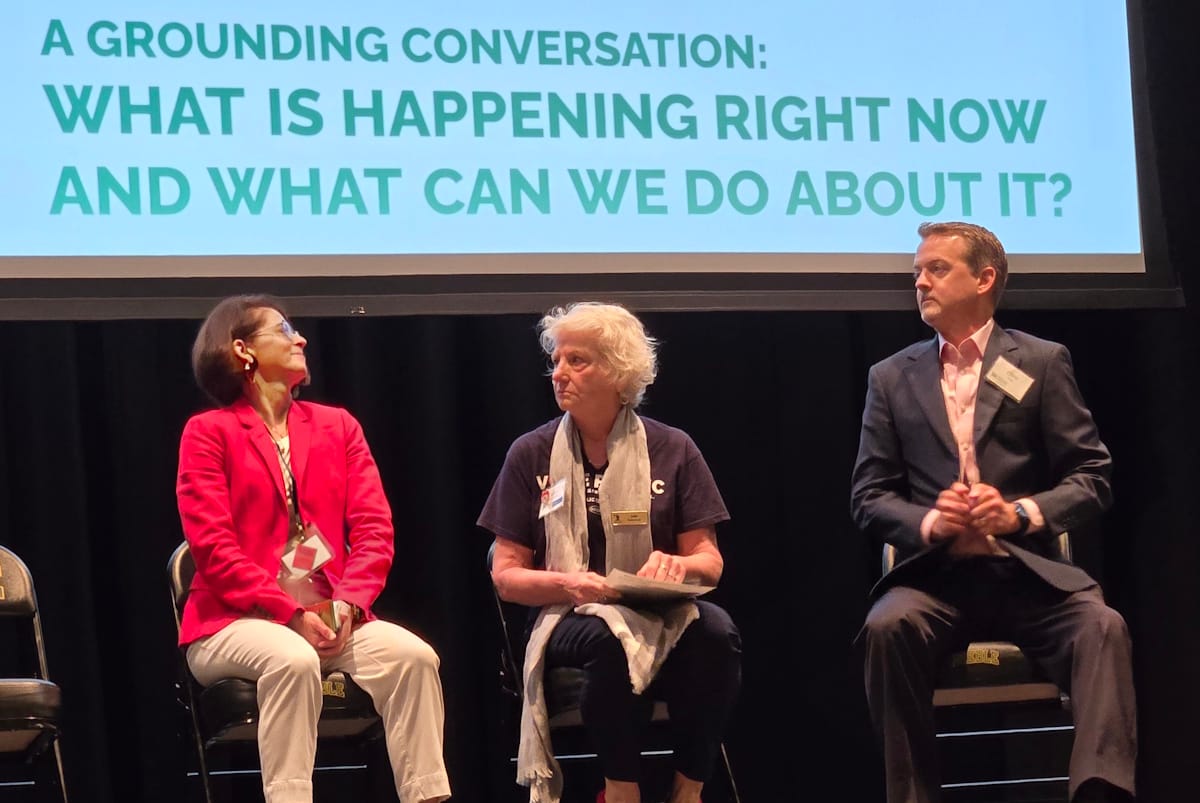
- WPEN Summer Summit held in Green Bay with 100+ education advocates and leaders.
- State budget criticized for underfunding public schools—18 years without keeping pace with inflation.
- Green Bay launched a transparency initiative to show voucher and charter school costs on property tax bills.
- Experts warned of increased reliance on local referenda and growing funding disparities.
- Calls for a legal challenge to defend public school funding and oppose private school subsidies.
More than 100 public education advocates, educators, community leaders, and legislators gathered for a day of learning, sharing, and planning at the annual Summer Summit at Preble High School in Green Bay on July 24. The event was sponsored by the Wisconsin Public Education Network (WPEN).
In her welcome video, Dr. Jill Underly, State Superintendent of Public Instruction, thanked attendees for raising their voices and standing up for kids.
“You've reminded Wisconsin that public education isn't just a line item, it's a promise,” she said. “You've worked across communities to help districts pass referenda, to advance funding reform, and to make sure public schools remain strong, sustainable, and centered in every town and city in the state. You show up year-round. You lift up policies that serve students. You advocate with compassion and strategy. And you do it all because you believe, as I do, that every child in Wisconsin deserves a great public school,” concluded Underly.
Green Bay Mayor Eric Genrich reminded public education advocates that change is coming, thanks to the new fairer voting maps. “It has been a bleak quarter of a century or more for public education,” he said. “But that era is coming to an end.”
Green Bay became the first municipality to include the voucher and independent charter school costs on property tax bills. WPEN has developed a Transparency Project that will provide training and a toolkit to assist other districts that wish to follow Green Bay’s lead.
Disappointment all around with public education budget
The consensus among summit attendees was one of disappointment with the level of support for public education in the recent state budget. This marks 18 years since a budget has kept pace with inflation.
Heather DuBois Bourenane, Executive Director of WPEN, said her daughter graduated from high school this year and is “among the class of students that never once saw a budget that kept pace with inflation the entire time they travelled through our public schools. We have so much work to do.”
“We know what kids need,” she added. “We know how many people have shown up and testified at budget hearings around public education issues. We know there is a total lack of alignment between those needs and the fiscal priorities of the state as represented in the biennial budget.”
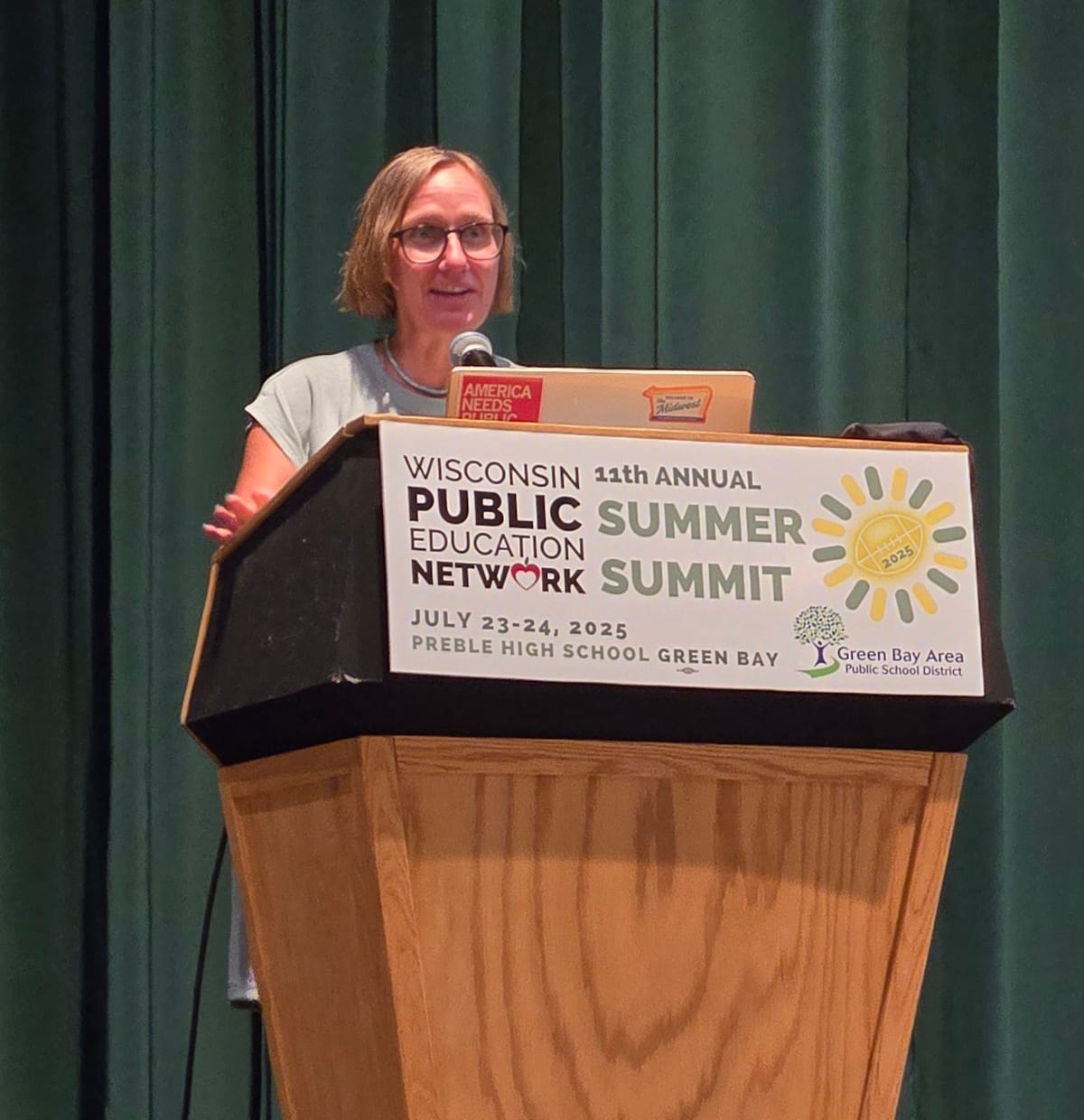
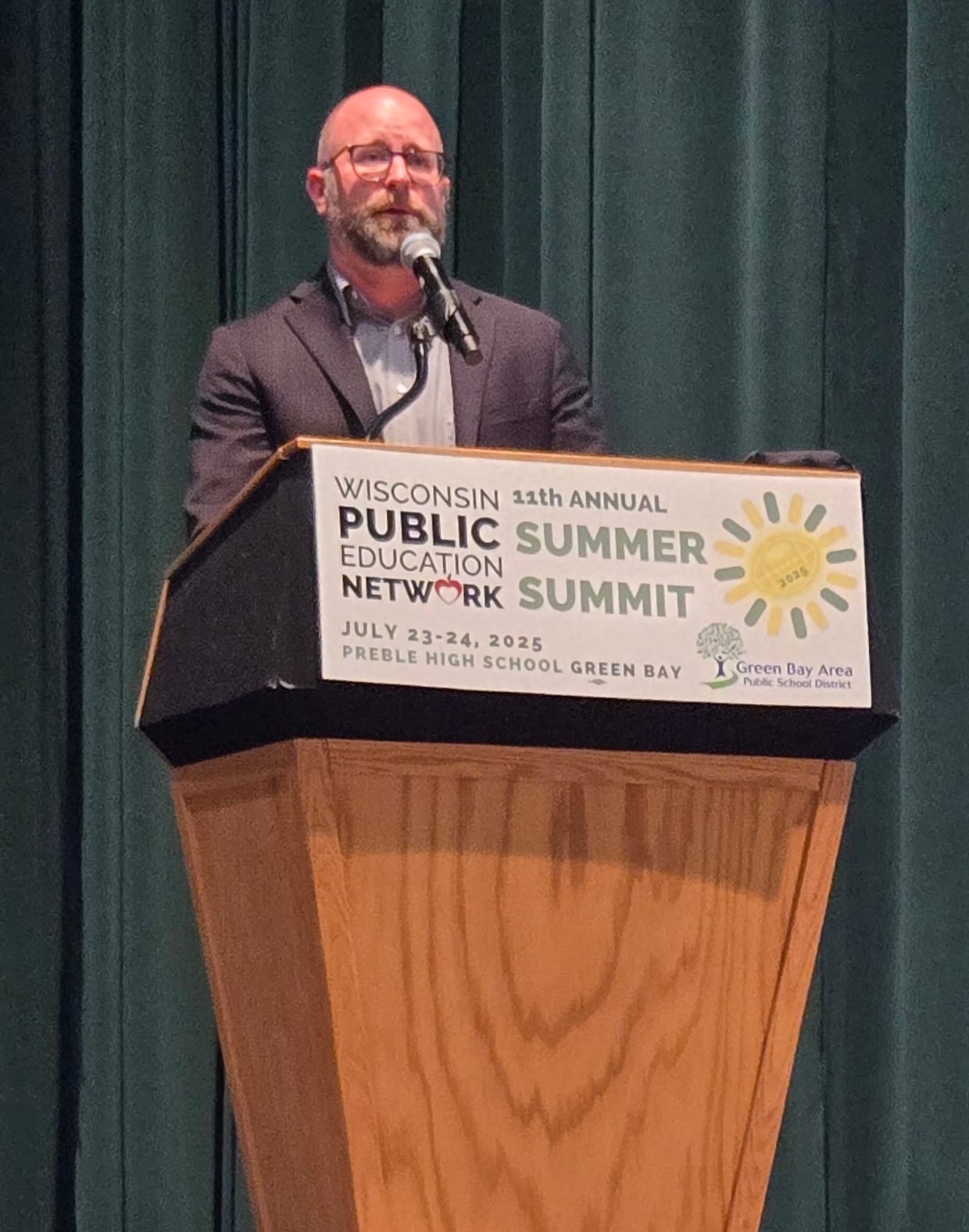
Heather DuBois Bourenane, Executive Director of WPEN and Green Bay mayor Eric Gengrich address the public education Summer Summit in Green Bay
Anne Chapman, Research Director of the Wisconsin Association of School Business Officials (WASBO), provided two key takeaways. The fact that there is zero increase in state general aid has serious ramifications, she said, and added that although there is a slight increase in the special education reimbursement rate, it is only a step in the right direction and not a solution.
“This is unprecedented,” she said. “We've never seen a full two-year budget when there was no increase in general aids in both years.”
That means, she said, that the $325/pupil increase provided by Governor Evers’s 400-year veto – an amount that still does not keep pace with inflation – would be passed on to property taxpayers.
“So when you hear the governor and others say that this budget provides $1.4 billion in spendable resources for schools, that is not all state money,” she explained. “Only about $570 million of that is state money (primarily for special education). The rest is mostly going to be borne by property taxpayers.”
Chris Thiel, Legislative Policy Manager at Milwaukee Public Schools, referred to research conducted by the Wisconsin Policy Forum, which found that Wisconsin has dropped from 11th to 26th in public school funding. Wisconsin may in fact rate much lower because schools have so often been funded through referenda, thereby misrepresenting the state's actual funding of public schools.
Experts argue that funding through referenda creates a widening disparity in districts across the state and is unsustainable.
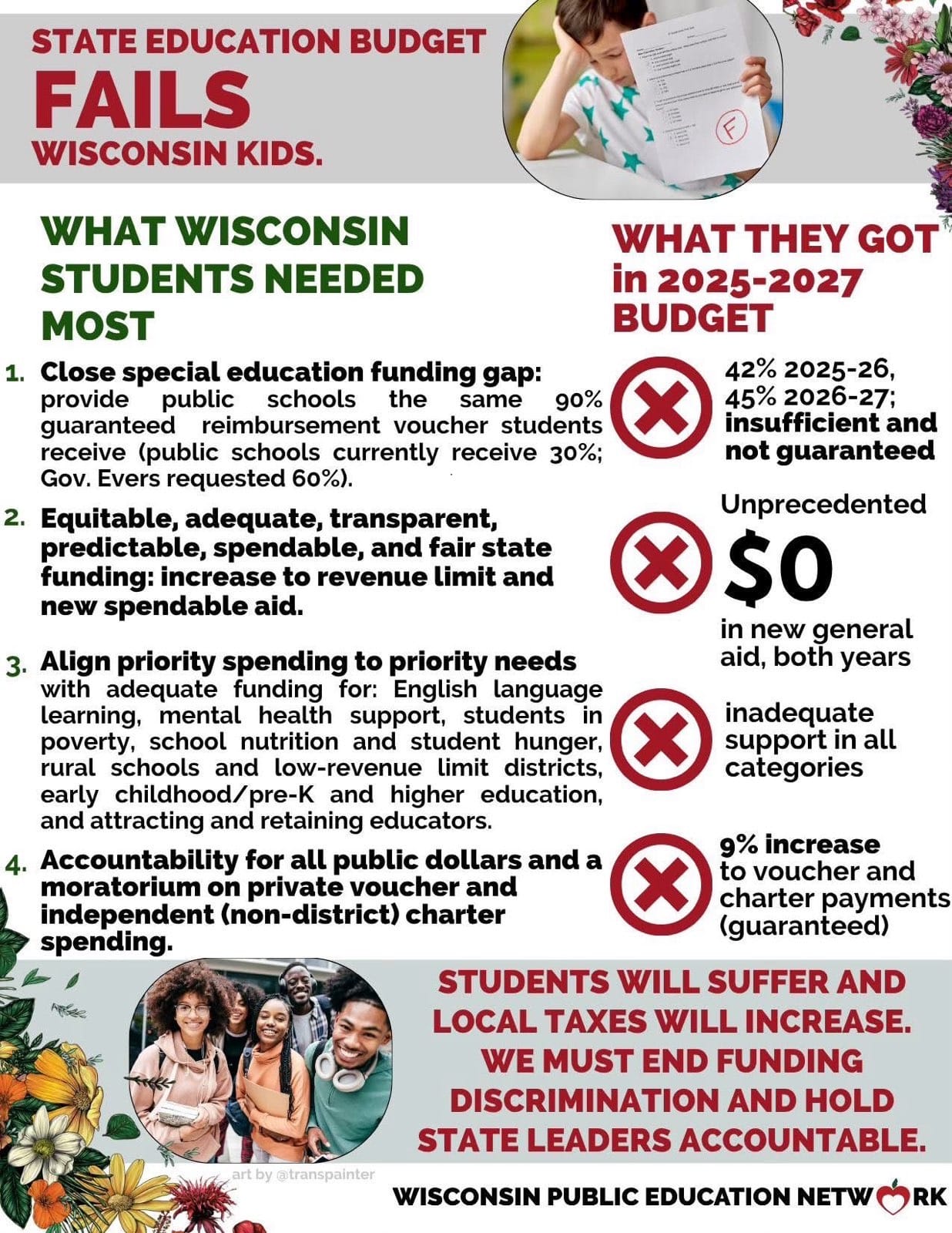
A possible court challenge
Dr. Julie Underwood, Dean Emerita of the UW-Madison School of Education and a member of the Wisconsin Alliance for Excellent Schools (WAES), explained that when schools are funded at less than the inflation rate, it is actually a cut. While investment in public schools has been dwindling, approximately $800 million has been spent each year on private school subsidies.
“There are school districts who might be in a world of hurt these days, especially school districts that have a high percentage of their funds coming from federal money,” said Underwood. In a previous interview with The Dairyland Patriot, Underwood warned about the potential impact of the executive order to dismantle the U.S. Department of Education.
Underwood went on to explain that it will likely be difficult for a community to understand that, despite special education funding increases, property taxes will also increase, and that further cuts may be required. In addition, it may still be necessary to hold a referendum.
“The most important thing to remember is that the Wisconsin Constitution gives our legislature one constitutional obligation, and that is to provide a system of public schools that is as uniform as practicable,” she argued.
In a past ruling, the Wisconsin Supreme Court recognized that “kids who have special needs, kids whose home language is not English, and kids who live in poverty, are more expensive to educate. They have higher needs. So those districts have to spend more money.”
Underwood underscored the legislature’s obligation to spend enough money to educate kids and to target that money in districts to meet those needs. They have not done that, she said.
“And the fact that they have now given us zero state dollars makes it even worse,” she said. “What a slap in the face that they're not doing their job when they have enough money to do it. You can spend money on private schools as long as you're doing your job with the public schools, and they're not doing their job with the public schools.”
“We need to take this to court to advocate for children's constitutional rights to an education. Somebody needs to sue against vouchers. Both of those cases are good cases. They are cases that can be won.”






